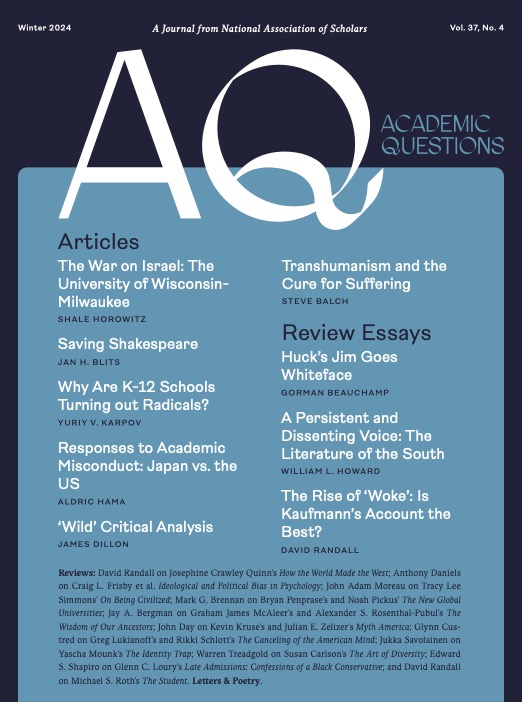The Wisdom of Our Ancestors: Conservative Humanism and the Western Tradition, Graham James McAleer, Alexander S. Rosenthal-Pubul, University of Notre Dame Press, 2023, pp. 314, $55.00 hardcover.
In The Wisdom of our Ancestors, Graham James McAleer and Alexander S. Rosenthal-Pubul undertake the laudable task of asking whether there exists “a specifically conservative political philosophy” that is intellectually and morally distinguishable from “liberal cosmopolitanism” on the one hand, and “nationalistic tribalism” on the other. (xv) By answering in the affirmative, they recalibrate Western Civilization as more than the tradition of rational inquiry pioneered by the Greeks, and the moral universalism and absolutism in Judaism and Christianity. In this endeavor they locate the conservatism they favor, exemplified most recently in the Pontificate of Benedict XVI, in an amalgam of Christianity, Hellenism, and Latin culture. As they see it, conservatism is rightly distrustful of liberal pretensions to man’s self-perfection, from which emerged the motivation and justification for the atrocities in the twentieth century perpetrated by communists in the Soviet Union, China, and elsewhere.
But the authors also inveigh against a new nationalism, grounded in a form of populism politically powerful on both sides of the Atlantic and personified most strikingly by Donald Trump and Viktor Orban. In the political spectrum the authors conjure for their readers, conservatism is the epitome of moderation, positioned precisely between its more extreme political and intellectual antagonists. While the authors do not state this explicitly, the way they position liberalism on this spectrum suggests that this avowedly rational ideology is actually more grounded in irrationality and emotion than its conservative antipode.
The originality of the authors’ typology of ideologies is refreshing, and they make the case for it eloquently. They also provide ample corroboration for their arguments, which they deliberately fashion as a commentary on the works of the recent conservative theorists Roger Scruton and Eric Voegelin. The book also reads like a rebuttal of Francis Fukuyama and his controversial thesis, advanced when the West won the Cold War in the late twentieth century, that this victory marked “the end of history.” From the authors’ arguments this reviewer learned a great deal and found himself rethinking traditional assumptions about what Western Civilization consists of. From something in which liberalism was its original essence and conservatism a reaction to it that followed it chronologically, Western Civilization should more properly be seen as an ongoing conversation between liberalism and conservatism on the relative merits of what is best in each ideology, most notably a recognition of the autonomy and sanctity of the individual in the former, and a proper emphasis on tradition and “the wisdom of the ages” in the latter.
The principal argument the book advances is simple. Conservatism is what the word itself suggests. The purpose of conservatism is to conserve—to retain for the future the best that one finds in the past. Practically speaking, three institutions in society are able to do this: religion, because “the core of common culture is religion”; the family, because nothing worth conserving can be conserved without it; and education, because it is the means, outside the family, by which a society’s values are formally transmitted (5).
When all three institutions do what they are supposed to do, communities can emerge with all manner of voluntary associations protecting the individual from the state. And far from precluding the individual’s cultivation of moral virtue, these communities facilitate it. What emerges is not an economy and a society based on a free market and driven by any natural harmony of interests, as classical liberals like Adam Smith believed.
Instead, conservatism leaves it to societies to determine the institutional arrangements—political, economic, and social—that work best for them. Once they do so, individuals can begin the task of moral improvement, not as discrete “atoms” whose pursuit of self-interest will magically benefit everyone, but with a healthy respect for the external bonds grounded in collective habits and traditions that emerged organically before they were born. The individual and the society around him exist in a complementary relationship, and what makes it so is not politics but culture. For conservatives, politics exists to foster and protect culture, which should always be the ultimate guide for how people should live. Contrary to classical liberalism, in the conservative scheme of things laissez-faire exists to protect not just the individual, but also a society’s culture, from the potentially ruinous depredations of the state.
The Wisdom of Our Ancestors argues its case in clear and often elegant prose. The points it makes are easily understood; even better, these are amply corroborated by empirical evidence. This is a work of history as well as of political philosophy, and any historian reading it will know this immediately. The authors’ command of the history of conservatism, and of what has been written about it, is encyclopedic.
In a work of such ambition, its depth no less remarkable than its breadth, inevitably one finds nits to pick. One might question the authors’ slight denigration of Edmund Burke’s conservatism for emerging in response to an exogenous event—in Burke’s case the French Revolution—rather than as a discrete philosophy conceivable through pure cogitation. One can also quibble with their claim that conservatives could learn much from psychoanalysis, which in its Freudian incarnation remains, in Karl Popper’s apt characterization, “the most stupendous confidence-trick of the twentieth century.”
Furthermore, the authors take Alexander Dugin and his pseudo-ideology of Eurasianism too seriously. Quite apart from his mysticism, antisemitism, and psychotic musings about Nikita Khrushchev, the Soviet leader who succeeded Stalin, being a secret agent of NATO, Dugin is also a cunning opportunist whose patchwork of ideas, loosely based on a vision of Russia as more Asian than Western, was largely intended to curry favor with Vladimir Putin, whose justification of his multiple aggressions has included imprecations against the West remarkably similar to Dugin’s. To be sure, there are credible antecedents to Dugin in Russian history such as Nikolai Danilevsky, whose extended 1869 essay, Russia and Europe, is a serious meditation on what it means to be Russian and that sees Russia’s moral salvation in a rejection of the West. But Dugin, by contrast, is little more than a fantasist who gulled the authors in much the way he has the current leader of Russia.
But perhaps the most glaring shortcoming of The Wisdom of our Ancestors is the authors’ explicit exclusion of any consideration of American conservatism (205). While understandable in tactical terms as a means of keeping a short book from becoming a much longer one, one cannot help but feel that this leaves the reader ignorant of how, if at all, American conservatism is different from its counterparts across the Atlantic and in other parts of the world, most notably China, to which the authors devote considerable attention. If American Civilization is an extension or subspecies of Western Civilization, then surely any analysis of conservatism in the West has to take into account its emergence and development in America. Fortunately, there now exists an excellent history and analysis of American conservatism: The Right: The Hundred Year War for American Conservatism (New York, 2022), by Matthew Continetti.
Notwithstanding all of this, readers of Academic Questions will find much to admire in this book. Intentionally or not, it is a defense of the West against its Woke enemies on college and university campuses across America and in Europe. While The Wisdom of Our Ancestors does not acknowledge this explicitly, one finishes it cognizant of how seriously people in the West have pondered the most fundamental aspects of human existence—and that the reason so many of them have done so, quite apart from native intelligence and curiosity, is that they have enjoyed a degree of political and intellectual freedom greater than in any other part of the world. What constitutes a society that is just, and how its institutions should be configured to ensure simultaneously the dignity and worth of the individual—this is just one of several questions people in the West have been able to answer openly and honestly.
Where else in the world—other than in the West—are questions like this one trashed out without constrictions imposed by the stifling orthodoxies of authoritarian governments? Students in American universities today, marinated as they are in masochistic flagellations of America and the West by their supposedly more educated professors, have no way of answering this question because their professors would never dream of asking it. But The Wisdom of Our Ancestors enables them to do so. If one learns nothing more from this book than that freedom is more valued in the West than anywhere else in the world, reading it will still have been a good use of one’s time.
Jay A. Bergman is Professor of History at Central Connecticut State University and serves on the Board of Directors of the National Association of Scholars. His most recent book is The French Revolutionary Tradition in Russian and Soviet Politics, Political Thought, and Culture, published by Oxford University Press. Bergman wrote “Introduction to the Extract from Richard Pipes’ The Russian Revolution,” for our Fall 2024 issue.
Photo by Federico Di Dio photography on Unsplash














